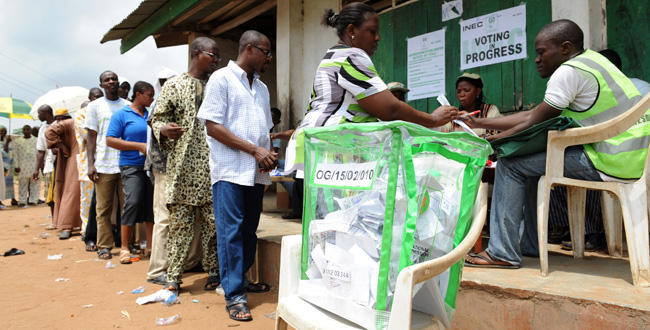Voting in Nigeria’s elections continued in certain areas on Sunday after technical problems prevented some people from casting their ballots on Saturday and despite extremist violence in the northeast and protests in the south.
Suspected Boko Haram extremists attacked polling stations and destroyed election material in two northeastern towns. Fleeing residents said scores of the extremists headed for Nigeria’s northeastern city of Bauchi and soldiers engaged them with heavy gunfire. Police spokesman Haruna Muhammad said security forces had stopped a convoy of 10 vehicles of “unidentified gunmen” at Dindima village, 10 kilometers (6 miles) from Bauchi.
Muhammad said the gunmen attacked polling stations in Kirfi and Alkaleri towns earlier Sunday.
Boko Haram members killed at least 41 people, including a legislator, and scared hundreds of people from polling stations in three states in the northeast on Saturday. Many Christian Nigerians attended Palm Sunday church services in which they prayed for a peaceful outcome for the elections.
In the southern oil-producing center of Port Harcourt, thousands of Nigerians took to the streets to protest alleged killings of opposition campaign workers and voting irregularities. Police in riot gear and armored cars moved in to control the demonstration.
Police reported that three people including a soldier were shot and killed in Port Harcourt Saturday. But the opposition coalition says scores of its members have been killed and blames thugs working for President Goodluck Jonathan’s party.
Elections were extended into Sunday in about 300 of the country’s 150,000 polling stations, including some areas of Lagos, Nigeria’s megacity of 20 million on the Atlantic coast, according to the country’s electoral commission. The extended voting was necessary because new voting equipment failed to confirm voters’ identities.
AP journalists could not find polling stations where the voting was continuing on Sunday, though election officials said it went ahead
Nearly 60 million Nigerians have cards to vote and for the first time there is a possibility that a challenger can defeat a sitting president in the high-stakes contest to govern Africa’s richest and most populous nation.
The front-runners among 14 candidates are President Goodluck Jonathan, a 57-year-old Christian from the south, and former military dictator Muhammadu Buhari, 72, from the predominantly Muslim north. Voters also are electing 360 legislators to the House of Assembly, where the opposition currently has a slight edge over Jonathan’s party. Voting for 13 constituencies was postponed until April because of shortages of ballot papers, electoral officials said.
Nigeria’s political landscape was transformed two years ago when the main opposition parties formed a coalition and for the first time united behind one candidate, Buhari. Dozens of legislators defected from Jonathan’s party.
A major campaign issue has been Boko Haram’s insurgency. The failure of Jonathan’s administration to curb the rebellion, which killed about 10,000 people last year, has angered many Nigerians. International outrage has grown over another failure – the government’s inability to rescue 219 schoolgirls kidnapped by Boko Haram nearly a year ago. The extremists have abducted hundreds more people since then, using them as sex slaves and fighters.
The uprising has exacerbated relations between Christians like Jonathan, who dominate the oil-rich south, and Muslims like Buhari, who are the majority in the agricultural and cattle-herding lands of the north. Nigeria’s population of 170 million is almost evenly divided between Christians and Muslims.
Some 1,000 people were killed in rioting after Buhari lost to Jonathan in the 2011 elections. Thousands of Nigerians and foreign workers have left the country amid fears of post-election violence. In 2011, there was no doubt that Jonathan had swept the polls by millions of votes. Now the race is much closer. Results are expected 48 hours after voting ends. If no clear winner emerges, a runoff will be held. SAPA






 WhatsApp us
WhatsApp us 

